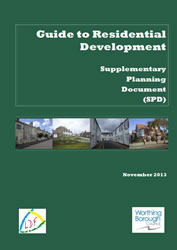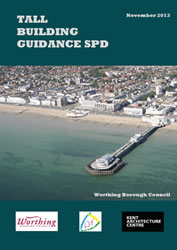Supplementary Planning Documents (SPD) & Supplementary Planning Guidance (SPG) (Worthing)
Introduction
A Supplementary Planning Document (SPD) provides greater details on the Council's policies set out in the Development Plan Documents (DPDs) or other higher level planning documents. In summary, SPDs provide guidance on local planning matters and they can be quicker and simpler to prepare than DPDs.
Whilst SPDs are not examined by an Inspector, they are still subject to a process of consultation and engagement with relevant parties. Ultimately, they must be adopted by council resolution. Although they are not required to have a specific link or 'hang off', a DPD they must be consistent with national planning policy. In most cases a SPD will not require a Sustainability Appraisal.
SPDs can take a number of forms but they can generally be categorised into two broad forms:
- Area based documents that include Masterplans and Development Briefs which deal with specific parcels of land.
- Topic based documents which provide additional information on a specific local issue.
A work programme to prepare new SPDs and update existing documents will be established following the adoption of the Worthing Local Plan. Details relating to this will be set out in the Local Development Scheme.
Guide to Residential Development SPD
 The purpose of this document is to provide general policy and design guidance for all residential development. In particular, it gives more detail on how a number of Core Strategy policies will be applied.
The purpose of this document is to provide general policy and design guidance for all residential development. In particular, it gives more detail on how a number of Core Strategy policies will be applied.
A key objective of the document is to ensure that all residential development is designed and built to create high quality homes and contribute to a good quality environment. Where the Council receives a planning application that involves residential development, the content of this SPD will be considered in determining the application.
See also:
 Adoption Statement for the Tall Buildings SPD and Guide to Residential Development SPD - November 2013 (104KB)
Adoption Statement for the Tall Buildings SPD and Guide to Residential Development SPD - November 2013 (104KB) Statement of Consultation for the Tall Buildings SPD and Guide to Residential Development SPD - November 2013 (383KB)
Statement of Consultation for the Tall Buildings SPD and Guide to Residential Development SPD - November 2013 (383KB)
Tall Building Guidance SPD

This document provides clear and consistent guidance on the design and location of tall buildings in Worthing.
The document will help to reduce the scope for inappropriate and speculative applications. It will also help to protect the historic environment and the qualities that make the town special. In addition, help to ensure that Worthing can benefit from the positive impacts that tall buildings can have on an area, particularly regarding regeneration.
See also:
 Adoption Statement for the Tall Buildings SPD and Guide to Residential Development SPD - November 2013 (104KB)
Adoption Statement for the Tall Buildings SPD and Guide to Residential Development SPD - November 2013 (104KB) Statement of Consultation for the Tall Buildings SPD and Guide to Residential Development SPD - November 2013 (383KB)
Statement of Consultation for the Tall Buildings SPD and Guide to Residential Development SPD - November 2013 (383KB)
Sustainable Economy SPD
The document provides detailed guidance on how these policies will be applied to relevant development:
- Core Strategy Policy 4 (Protecting Employment Opportunities)
- Policy 5 (Visitor Economy)
The starting principle is the retention of suitable and viable sites in employment use or in use as visitor accommodation. The criteria outlined will be used to determine any applications that involve the potential loss of employment floorspace or visitor accommodation.
Space Standards SPD
In 2012 Worthing Borough Council adopted a Space Standards SPD. This ensures that the floor and storage area space in new residential developments and conversions in Worthing is sufficient to secure a satisfactory standard of accommodation for their residents.
In March 2015 the Government published nationally described space standards that will largely replace the existing different standards used by local authorities. The nationally described technical housing standards, which are very similar to those adopted in the SPD for Worthing, provide the nationally recognised standard for bedrooms, storage and internal areas in new dwellings across all tenures.
When adopted, the new Worthing Local Plan (currently being prepared) will reference the nationally described space standards. Until that time the Council will expect relevant applications to adhere to either the standards set out in the SPD or the nationally described standards (linked below).
Unlike the Worthing SPD, the national standards do not relate to conversions. Therefore, where the Council receives an application for a conversion to residential use, the principles set out in the Council's SPD will continue to be given due regard. Furthermore, the new national standards do not provide information on external space standards. For this reason, Section 6 of the Council's SPD should still be taken into account as relevant applications are being prepared.
- Link to Technical Housing Standards - Nationally Described Space Standards - on the GOV.UK website
 Space Standards SPD - Feb 2012 (810KB)
Space Standards SPD - Feb 2012 (810KB) Adoption Statement Feb 2012 - Space Standards and Sustainable Economy SPD (40KB)
Adoption Statement Feb 2012 - Space Standards and Sustainable Economy SPD (40KB) Statement of Consultation - Space Standards SPD and Sustainable Economy SPD (448KB)
Statement of Consultation - Space Standards SPD and Sustainable Economy SPD (448KB)
Draft Planning Contributions SPD for Worthing - October 2007
Further information can be found at:
Developer Contributions SPD - July 2015
The Council and developers have a responsibility, through the planning process, to manage the impact of growth and ensure that any potential harm caused by new development is mitigated. The Council therefore expects new development to contribute to site related and other infrastructure needs.
In February 2015 the Council adopted a Community Infrastructure Levy (CIL) which will be implemented on 1st October 2015. The introduction of CIL will change the way in which developers contribute to the provision of infrastructure in the Borough. The purpose of the SPD is to summarise the different mechanisms which will be used and the relationship between them.
 Developer Contributions SPD - July 2015 (499KB)
Developer Contributions SPD - July 2015 (499KB) Developer Contributions SPD - Adoption Statement (166KB)
Developer Contributions SPD - Adoption Statement (166KB)
Existing SPGs
In addition to the SPGs currently being progressed there are a number of existing Supplementary Planning Guidance (SPG) documents that will continue to help inform planning decisions. These documents (listed below) will continue to be a material consideration until such time they are superseded by new Local Development Documents being prepared to support the Core Strategy.
Worthing Planning and Climate Change Checklist
The Climate Change Act 2008, commits the UK to bring all greenhouse gas emissions to net zero by 2050. Adur & Worthing Councils' declared Climate Emergency in July 2019 and has committed to work towards becoming carbon neutral by 2030. The Councils have also signed the UK100 Cities Pledge to achieve 100% clean energy by 2050.
The Local Plan vision and strategic objectives reflect these commitments and recognise the importance of adapting and increasing resilience to the effects of climate change. Furthermore, facilitating affordable, clean and secure energy.
Climate change is a cross cutting issue, the purpose of this checklist is therefore to collate the adopted local plan policies relating to climate change in one place and highlight the relevant minimum requirements that development should meet.

Need assistance with this service?
Get in touch:
Planning Policy
Problem with this page?
Page last updated: 22 May 2025

